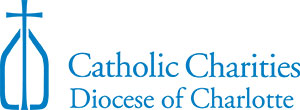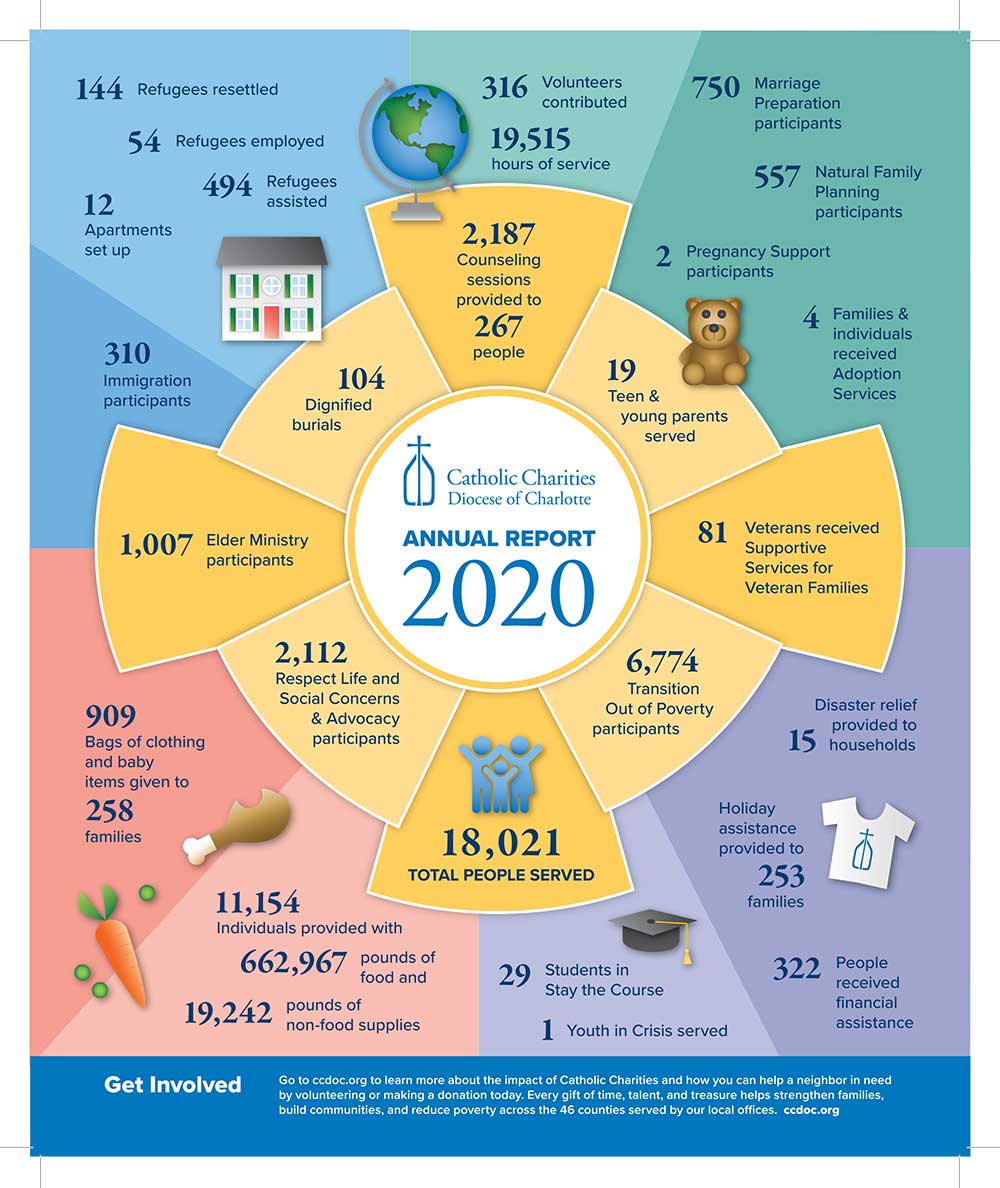Celebrating Catholic Charities Week May 1-8
Catholic Charities Week, May 1-8, is an opportunity to spotlight the work of Catholic Charities Diocese of Charlotte throughout western North Carolina over the past year.
Like no other year in its 71-year history, the social services agency has risen to the challenges of the COVID-19 pandemic, finding innovative solutions and teaming up with community organizations to serve more than 18,021 people across western North Carolina last year alone.
Staff and volunteers have worked diligently to meet the unprecedented demands for food, rent and utilities assistance, launched online counseling services, and more. (On pages 16-17, see a snapshot of the comprehensive social services provided in 2020.)
And they have not slowed down in 2021. The agency’s latest efforts include reaching out to persons experiencing homelessness – particularly veterans and people displaced from a homeless encampment in Charlotte – exemplifying the Church’s mission to “go to the margins,” as Pope Francis has urged, especially in response to the hardships caused by the pandemic.
Emergency food assistance
Catholic Charities’ three food pantries in Asheville, Charlotte and Winston-Salem distributed more than 662,967 pounds of food to 11,154 people last year, and the need for food aid during the pandemic continues.
For example, the Western Region Office is now serving approximately 600 people each month. The office in Asheville has expanded its partnership with MANNA FoodBank. Catholic Charities staff and volunteers are also helping with the leadership of a MANNA Community Market on the second Tuesday of each month in Woodfin, working with volunteers from St. Eugene Church and the north Asheville area.
“When businesses and other charitable services were closing their doors due to the pandemic, the Asheville Catholic Charities office adapted overnight to the crisis,” explains Rick Lober, Western Region Office volunteer.
“We immediately opened a drive-through option for the food pantry. As the numbers of recipients swelled, we rose to the occasion and beefed up our procedures to deliver services more efficiently and safely. When some Transition Out of Poverty program participants were stuck in their homes, we arranged a safe, contactless delivery of essential food and provisions,” Lober says.
“None of this was possible without dedicated staff and volunteers willing to serve our community in a time of uncertainty.”
The Piedmont Triad office also made arrangements for food to be delivered to people who could not come to the pantry.
“Volunteers and a local taxi company delivered food to older individuals or those with health issues who were afraid to leave their home due to COVID-19,” says Becky DuBois, Piedmont Triad region director. “We were also fortunate to receive a small grant that allowed us to purchase rolling shopping carts, allowing people who walk to our pantry to receive and transport more food for their family.”
Mental health counseling
When in-person mental health counseling services ceased because of the pandemic, Catholic Charities pivoted to “tele-counseling” sessions to provide access to counseling services for 267 people.
More than 2,187 “tele-counseling” sessions have been held through a new, easy-to-use and secure, HIPAA-compliant platform. People now use their computer, mobile phone or tablet to have a one-on-one, confidential video session with a counselor. The online sessions last about an hour and feature the same quality and types of services as in-person counseling.
“Once it became clear that this pandemic was not going to end within a few weeks, and that restrictions on face-to-face services were going to be a new reality, our mental health counselors worked closely together with our administrative staff to explore and then adopt innovative ways to provide therapy in a way that permitted us to serve our clients while also affording the same confidentiality protection,” says Dr. Gerard Carter, Catholic Charities’ executive director.
Housing for veterans
Starting in October 2019, Catholic Charities launched Supportive Services For Veterans Families (SSVF), a program to serve veterans and their families who are homeless or are in danger of becoming homeless.
Thanks to a $500,000 annual grant from the U.S. Department of Veterans Affairs, Catholic Charities has provided eligible veterans and their families with housing location services, case management and assistance in obtaining VA and other benefits.
Since that initial grant, Catholic Charities has received an additional $467,000 in federal CARES Act funding through the VA to support veterans without homes and prevent homelessness in veterans who are already housed.
In 2020, during the height of the pandemic, CARES Act funding enabled the agency to temporarily house another 96 veterans experiencing homelessness in hotel rooms while agency staff searched for housing. They have also stepped up their prevention work – rent and utility payments for housed veterans to prevent eviction due to pandemic-related income loss.
So far this year, Catholic Charities has helped 29 veterans with finding affordable housing, and rent or utilities assistance.
“For me to continue to provide services to a vulnerable population in light of a global pandemic has had it challenges,” says Tonya Lawrence, SSVF case coordinator. “I started with Catholic Charities in the middle of the pandemic. I wasn’t able to have the face-to-face interaction with my clients or other staff. That was very challenging working with others and not being able to build the rapport face-to-face.”
Lawrence says, “Over the past year, COVID-19 has shown me that at any abrupt moment our lives can change drastically – but being able to continue to serve others, and assist our veterans to prevent homelessness and regain permanent housing, proves we can persevere through anything, continue to help others and achieve the goal of the program.”
Encampment project
Taking its mission even further, Catholic Charities is now collaborating with community and grass-roots organizations to help a number of Charlotteans who had been living in and around the North End community. “Tent City,” as it became known, had grown to more than 100 people living in tents in unsafe and unsanitary conditions. The encampment was cleared by county health officials in February, and the residents moved temporarily to hotel rooms until community groups could identify more permanent solutions.
Using $2.1 million in federal CARES Act funding allocated from the City of Charlotte, several organizations including Catholic Charities are coming together to provide rental subsidies and supportive services to people formerly living in the encampment. The partnership includes the United Way of Central Carolinas, the housing assistance nonprofit Socialserve and Catholic Charities.
While other community organizations find housing for these individuals, Catholic Charities will provide “wraparound” supportive services for up to 75 households – connecting them with job training, healthcare, education, and any other needs to help them get back on their feet over the next 12 months.
“Catholic Charities was invited to participate because of our reputation as a case management provider,” notes Sandra Buck, Catholic Charities’ Charlotte region director. “Our case management model employs a strengths-based approach and focuses on long-term strategies to help our participants achieve sustainable outcomes. Case coordinators empower program participants to identify, enhance and use their strengths to overcome their identified obstacles.
“We are excited to be a part of this organized effort and look forward to working in concert with the other providers toward this goal.”
— SueAnn Howell, Senior reporter
How can you help?
Financial donations to enable Catholic Charities to assist participants and buy food are an effective way to help serve people in need at this time. Make donations online at www.ccdoc.org (click on “Donate”); or by mail to: Catholic Charities, Central Processing All Regions, 1123 S. Church St., Charlotte, NC 28203-4003.
Need assistance?
Catholic Charities is offering services to as many people in need as possible during the COVID-19 pandemic. People in western North Carolina can email This email address is being protected from spambots. You need JavaScript enabled to view it. or reach out to their local Catholic Charities office:
Asheville 828-255-0146
Charlotte 704-370-3262
Greensboro 336-288-1984
Lenoir 828-434-5710
Murphy 828-835-3535
Winston-Salem 336-727-0705
Individuals needing assistance can also call 2-1-1 to find up-to-date information on available community services that may be available. 2-1-1 helps connect people to information about local food pantries, medical resources and possible changes to government benefits.




